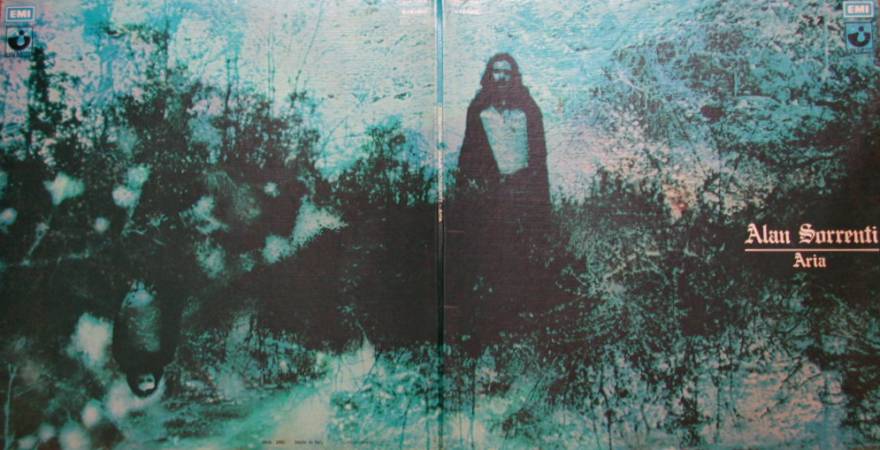Aria is the debut album by the Neapolitan singer/composer Alan Sorrenti. And although I haven’t heard nearly all of his more than a dozen albums, it is by general consensus by far Sorrenti’s best and most progressive. Later in his career, Sorrenti started making disco music and even ended up representing Italy in the Eurovision Song Contest in 1980.
But let’s quickly shake off the horrors of the Eurovision Song Contest and return to Sorrenti’s fine debut album Aria.
Aria is gorgeous and very very emotional and theatrical singer-songwriter prog. The songs on the album are dark in tone and have a claustrophobic, oppressive feel. Sorrenti’s music on Aria is quite original, but there is some comparison with Tim Buckley’s Starsailor album. Peter Hammill must also have had some influence on Sorrenti.
Especially the 20-minute title epic ”Aria” is a masterful work in all its mania. The song is characterised by Sorrent’s long stretched out agonised moaning and laughing voices… aaaaaaaaa… eeeeee… iiiiiiiih… are at their best really effective in creating a very extraordinary atmosphere. Sorrent’s vocalisation of the song is delightfully unrestrained and unabashed.

The instrumentation is largely acoustic, ranging from very small-scale to quite massive. The last half of ”Aria” features a great flamenco section that fits the mood of the song perfectly. Vittorio Nazzaro’s skilful acoustic guitar gives the song a boost, and there is a brief transition to an almost orchestral sound with trombone and Mellotron. The fiery violin of virtuoso star Jean Luc Ponty, who appears only on the first track, also adds a nice touch of power and edge.
Italian prog albums often sing with great emotion, but as someone who doesn’t know the language, I can never be sure if the lyrics are worthy of such emotional storms. In the case of Aria, however, I have been able to read a quality translation and I am happy to say that Sorrenti’s poetic lyrics are also of high quality.
Aria’s lyrics are mostly about love. The poetic lyrics are sometimes a bit clichéd in their wording, but on the other hand they contain such a fascinating and even morbid obsession that the whole is a clear winner. In Sorrenti’s texts, love and death are intertwined in a greedy and grotesque way. The content and form of the lyrics match Sorrent’s passionate and borderline insane interpretation very well.
The three shorter tracks on the b-side of Aria are not quite as intense and impressive as the title track, but they are also very pleasant to listen to. Especially the third track ”La mia mente” comes close to the power of the title track because Sorrenti is also letting loose furiously in this track and is supported by the manic, and at times almost atonal, thumping of the electric piano in the background.
Sorrenti’s next album, Come Un Vecchio In Incensiere All’Alba Di Un Villaggio Deserto (1973), is similar in style to Aria, although not quite as hard-hitting. After that album, Sorrenti moved, or had to move, away from progressive music.
Aria is a melancholic, haunting and unique musical journey that may not be an easy listen if you’re not used to extreme vocal performances, but I would venture to say that immersing yourself in this album is well worth it and ultimately richly rewarding.
Best tracks: ”Aria”, ”La mia mente”
Author: JANNE YLIRUUSI
Tracks
- ”Aria” – 19:45
- ”Vorrei incontrarti” – 4:56
- ”La mia mente” – 7:34
- ”Un fiume tranquillo” – 7:57
Musicians:
Alan Sorrenti: vocals, acoustic guitar Tony Esposito: drums, percussion Vittorio Nazzaro: bass, acoustic guitars Albert Prince: piano , ARP synthesizer, organ Hammond organ, Mellotron Martin Paratore: acoustic guitar Luciano Cilio: piano Tony Bonfils: double bass Jean-Luc Ponty: violin (”Aria”) Andrè Lajdli: trumpet Jean Costa: trombone
Producer: Michelangelo Romano
Label: Harvest

Jätä kommentti